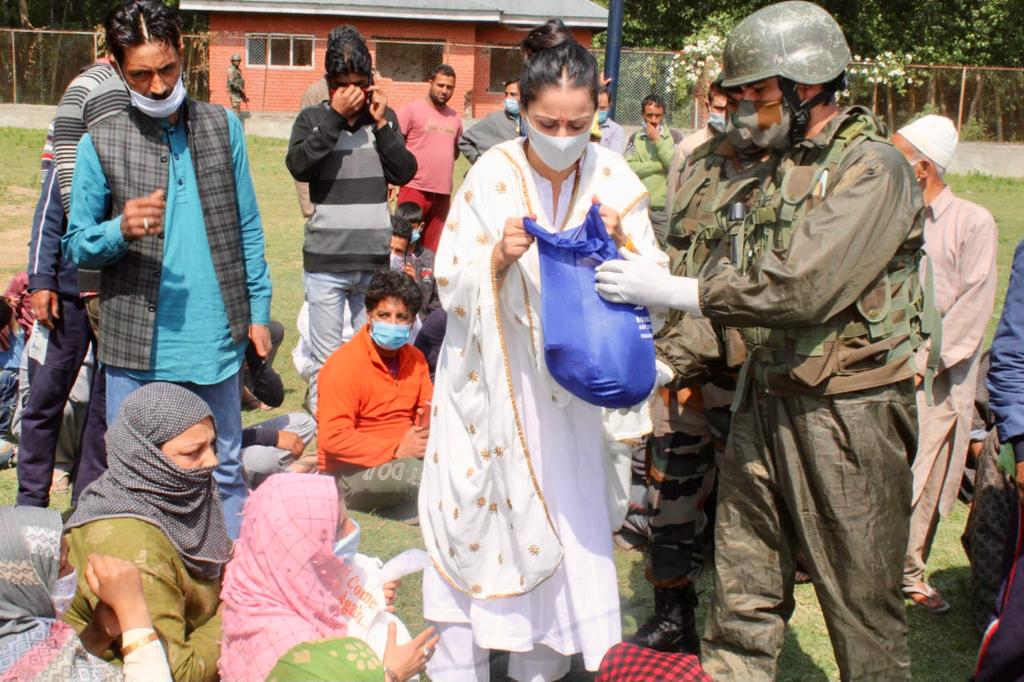

The Indian Army is working with professional social organisations to help Covid-affected people in Jammu and Kashmir (Photo: RNAF)
<p>
The second wave of the coronavirus pandemic has left behind unparalleled devastation. This time it has enveloped rural communities including those in Jammu and Kashmir.</p>
<p>
The Indian Army, along with other&nbsp;support groups is helping out people in the rural areas of Kashmir and the marginalised regions of Jammu.</p>
<p>
India Narrative speaks with one such organisation that expanded its work from Maharashtra to J&amp;K during the covid crisis. The Rouble Nagi Art Foundation (RNAF) began providing food and health essentials to people as the intensity of the pandemic increased and the needs of the people underwent a significant change.</p>
<p>
<img alt="" src="https://www.indianarrative.com/upload/news/RNAF_Art_Work.jpeg" style="width: 768px; height: 1024px;" /></p>
<p>
<em>The initial workshops focussed on interacting with and building a rapport with the youth of Jammu and Kashmir (Photo: RNAF)<br />
</em></p>
<p>
<strong>Workshops during the first wave</strong></p>
<p>
Rouble Nagi, social worker and artist, who runs the eponymous organisation Rouble Nagi Art Foundation, says: &ldquo;We began working in J&amp;K during the first wave of coronavirus. At that time the needs of society were different. We held workshops on financial&nbsp;independence for women. For the youth, it was workshops on art. We were overwhelmed as for a workshop of 120, we would get up to 600 women and girls.&rdquo;</p>
<p>
The foundation interacted with the participants, and identified their interests and skills. The objective was to make the women &lsquo;aatmnirbhar&rsquo; – financially self-sufficient. Here Nagi realised that Kashmiri women were skilled in traditional craftsmanship and those skills had to be honed.</p>
<p>
<img alt="" src="https://www.indianarrative.com/upload/news/RNAF_Women_J&amp;K.jpeg" /></p>
<p>
<em>The women and girls in J&amp;K showed unexpected enthusiastic in participating in various kinds of workshops&nbsp;(Photo: RNAF)</em></p>
<p>
For the youth, the RNAF worked on educating through art, expressing through art. &ldquo;We found that young people found it easy to express themselves through art. But this was in 2020 – the first wave of the pandemic.&quot;</p>
<p>
<strong>The scourge of the second wage</strong></p>
<p>
&quot;In 2021, things changed completely. Now the demand from the grassroots was rations, soaps, sanitizers. Our volunteers kept bringing the news that our centres had to be converted to covid shelters and that people were demanding food,&rdquo; Nagi says.</p>
<p>
Faced with new realities, RNAF changed its strategy from capacity building to providing medical aid, creating shelter and delivering food. During the course of the second wage, the RNAF provided food packed to around 2,000 families in Kashmir&mdash;mostly in rural areas. In Jammu, it reached out to 600 families.</p>
<p>
&ldquo;We worked with the moto &lsquo;nobody sleeps hungry&rsquo;,&rdquo; says Nagi.</p>
<p>
<strong>Role of the Indian Army</strong></p>
<p>
Nagi says that it would have been impossible without the help of the Indian Army to carry out such an extensive humanitarian exercise in the region. &ldquo;The army helped us in identifying the areas that were in need. They connected us to the local people and influencers. There are regions in J&amp;K which nobody is aware off&mdash;except the army or the local people.&rdquo;</p>
<p>
<img alt="" src="https://www.indianarrative.com/upload/news/RNAF_Indian_Army_J&amp;K.jpg" /></p>
<p>
<em>The Indian Army has expanded operations beyond security to include development and humanitarian issues in Kashmir&nbsp;(Photo: RNAF)</em></p>
<p>
She adds that army personnel provided them logistic help as well as made them aware of the needs of the people. &ldquo;What I have to say about the Indian Army is that it works beyond the barriers of caste, borders and religion. When we work with them, we also go beyond our duty.&rdquo;</p>
<p>
<strong>Fund-raising and support</strong></p>
<p>
Nagi is aware of the responsibilities that come with humanitarian work and the expectations of the communities that you work with. Making promises to people who are in need can be fraught with problems if the funding and support is not diversified enough and is not delivered timely.</p>
<p>
She agrees that fund-raising is an essential ingredient of the social and humanitarian effort. &ldquo;Restaurants made food packets for us. Individuals came forward to donate money themselves. We held personal fundraisers and we launched appeals on fundraising platforms like Ketto and Milaap.&rdquo;</p>
<p>
Nagi shares an insight about Corporate Social Responsibility (CSR). &ldquo;CSR platforms take time, maybe months to deliver. In the second wave, we did not have the luxury of time to raise funding from companies.&rdquo;&nbsp;</p>
Minister for Electronics and Information Technology Ashwini Vaishnaw said on Friday that the government is…
Renowned human rights activist and political analyst Amjad Ayub Mirza has expressed a strong denunciation…
As was widely expected, the Indian economy grew by 6.5 per cent in real terms…
World No Tobacco Day, marked annually on 31 May, addresses a major public health challenge--the…
Defence Minister Rajnath Singh, addressing officers and sailors onboard India's first indigenous aircraft carrier INS…
The leadership team from the Central Tibetan Administration (CTA) arrived in Tokyo to participate in…